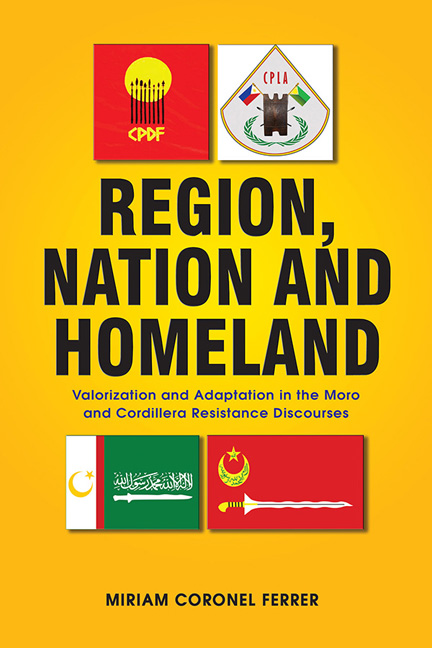 Region, Nation and Homeland
Region, Nation and Homeland Book contents
- Frontmatter
- Contents
- Preface
- List of Abbreviations
- Maps
- 1 Introduction: Text and Resistance
- 2 The Moro Liberation Movement: From Secession to Autonomy
- 3 The Cordillera Movement (1970s–2008): Building and Losing the Consensus
- 4 Nation, Homeland and Ancestral Domain: Intertextuality in the Moro Discourse
- 5 Identity Ambivalence in the Pan-Cordillera Discourse
- 6 Conclusion
- Bibliography
- Index
- About the Author
1 - Introduction: Text and Resistance
Published online by Cambridge University Press: 02 April 2020
- Frontmatter
- Contents
- Preface
- List of Abbreviations
- Maps
- 1 Introduction: Text and Resistance
- 2 The Moro Liberation Movement: From Secession to Autonomy
- 3 The Cordillera Movement (1970s–2008): Building and Losing the Consensus
- 4 Nation, Homeland and Ancestral Domain: Intertextuality in the Moro Discourse
- 5 Identity Ambivalence in the Pan-Cordillera Discourse
- 6 Conclusion
- Bibliography
- Index
- About the Author
Summary
“(D)iscourse as a political practice is not only a site of power struggle, but also a stake in power struggle…”
— Norman Fairclough, Discourse and Social Change (Cambridge: Polity Press, 1992), p. 67.Resistance discourses construct an alternative analysis of society, critique the power relations that govern that society, and condemn the resulting oppression of the population that the resistance promises to liberate. They propose the ways and means social change can be done, and elaborate the shape of a new polity. While the dominant societal discourse reflects dominant power relations and helps reproduce the status quo, anti-state resistance movements and their discourses are counter hegemonic. They aim to realign state power and institutions by mobilizing people around their critique of the status quo and in support of their alternative vision.
In this book, I examine the resistance discourses within the Moro and Cordillera armed movements. ‘Discourses of resistance’ have been described as those that highlight difference and affirm ‘resistant space’ in opposition to the institutionalized frame. Critical discourse analysis is particularly relevant as a framework and method of analysis, given its concern with “the radical changes that are taking place in contemporary social life: with how discourse figures within processes of change, and with shifts in the relationship between discourse … and other social elements within networks of practices”. The narratives of the Moro and Cordillera armed resistance are basically narratives of difference from the Filipino majority population. Both the Moro and Cordillera identity entrepreneurs waged what we can call ethnopolitical mobilizations that were directed against the Philippine state.
Ethnopolitical mobilizations are movements whose discourses claim or reclaim ethnicity-based identities in order to advance a political project that will recognize and institutionalize their identity claims. In the Philippines, and probably in most other contexts, ethnopolitical mobilizations are distinct from, although related to, class-based and other ideological struggles. They are distinct because of the pre-eminence that the asserted ‘ethnic identity’ plays in their claims. Their construction of their ethnic identities and corresponding claims are embodied in their discourses, and their discourses in turn also set the direction of their struggle to constitute and create new socio-political relations. Thus, an analysis of the narratives and/or discourses of such movements is crucial to understanding the nature and trajectory of these movements.
- Type
- Chapter
- Information
- Region, Nation and HomelandValorization and Adaptation in the Moro and Cordillera Resistance Discourses, pp. 1 - 12Publisher: ISEAS–Yusof Ishak InstitutePrint publication year: 2020
